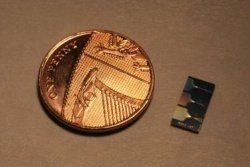Sep 29 2010
An international research group led by scientists from the University of Bristol in the UK has developed a new approach to quantum computing that could soon be used to perform complex calculations that cannot be done by today's computers. The research was funded in part by the QUANTIP ('Quantum integrated photonics') project, which received just over EUR 2 million under the 'Information and communication technologies' (ICT) Theme of the Seventh Framework Programme (FP7). The study was presented in the journal Science.
For their study, the scientists developed a silicon chip that could be used to perform complex calculations and simulations using quantum particles. They believe that their device represents a new route to a quantum computer — a powerful type of computer that uses quantum bits (qubits) rather than the conventional bits used in today's computers.
 This is the photonic chip next to a UK penny. The chip contains micrometre and sub-micrometre features and guide light using a network of waveguides. The output of this network can be seen on the surface of the chip. © Jasmin Meinecke
This is the photonic chip next to a UK penny. The chip contains micrometre and sub-micrometre features and guide light using a network of waveguides. The output of this network can be seen on the surface of the chip. © Jasmin Meinecke
Unlike conventional bits or transistors, which can be in one of only two states at any one time (1 or 0), a qubit can be in several states at the same time and can be used to hold and process a much larger amount of information at a greater rate.
'It is widely believed that a quantum computer will not become a reality for at least another 25 years,' said Professor Jeremy O'Brien, Director of the Centre for Quantum Photonics at the University of Bristol. 'However, we believe, using our new technique, a quantum computer could, in less than 10 years, be performing calculations that are outside the capabilities of conventional computers.'
The new technique uses two identical particles of light (photons) moving along a network of circuits in a silicon chip to perform an experiment known as a quantum walk. Quantum walk experiments using one photon have been done before and can even be modelled exactly by classical wave physics. However, this is the first time a quantum walk has been performed with two particles and the implications are far-reaching.
'Using a two-photon system, we can perform calculations that are exponentially more complex than before,' said Professor O'Brien. 'This is very much the beginning of a new field in quantum information science and will pave the way to quantum computers that will help us understand the most complex scientific problems.'
He suggested that the technique 'could improve our understanding of such important processes and help, for example, in the development of more efficient solar cells'. It could also be used in the creation of ultra-fast and efficient search engines, designing high-tech materials and new pharmaceuticals.
The scientists maintained that the leap from using one photon to two photons was far from trivial 'because the two particles need to be identical in every way and because of the way these particles interfere, or interact, with each other. There is no direct analogue of this interaction outside of quantum physics'. But they added that this development was far from the end of the road.
'Now that we can directly realise and observe two-photon quantum walks, the move to a three-photon, or multi-photon, device is relatively straightforward, but the results will be just as exciting,' said Professor O'Brien. 'Each time we add a photon, the complexity of the problem we are able to solve increases exponentially, so if a one-photon quantum walk has 10 outcomes, a two-photon system can give 100 outcomes and a three-photon system 1000 solutions and so on.'
The research group now plans to use the chip to perform quantum mechanical simulations and to increase the complexity of its experiments not only by adding more photons but also by using larger circuits.